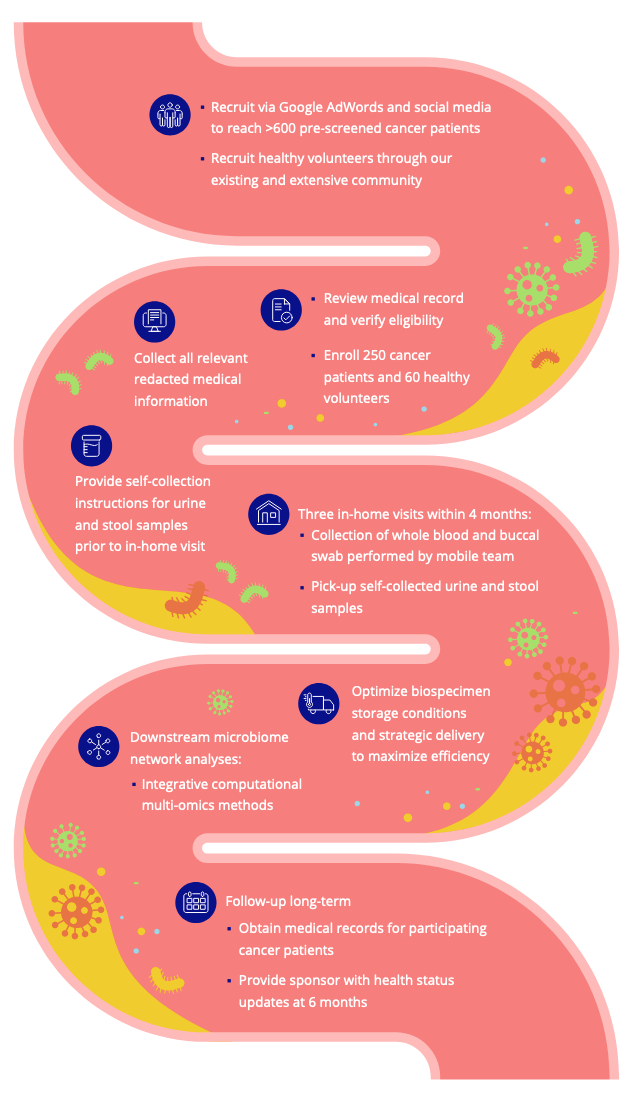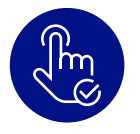
Multi-Collection Capabilities
POWERING MICROBIOME DISCOVERY IN CANCER
MISSION
To collect multiple biospecimen and data types over time from cancer patients and healthy volunteers for host–microbiome biomarker discover in cancer research.
CHALLENGES
- Identify eligible late-stage cancer patients to collect several different sample types from, at once, and over several in-home visits.
- Standardize the collection and processing of samples across the entire participant cohort.
- Complete long-term health status follow-up at 6 months.
SOLUTION
Online recruitment strategies allowed for rapid screening of eligible patients. Direct-to-patient, in-home specimen collection eased the burden of participation, particularly for stool and urine sample types.
Can Gut Microbes Enhance Cancer Treatment?
In recent years, the dynamic interplay between the microbiota, tumor microenvironment, and the immune system has been thrust into the forefront of scientific research. The complex and constantly changing relationship between these three biological entities has revealed important factors related to inflammation, oncogenic gene expression, and cancer progression.¹ Most interestingly, the finding that the microbiota exerts a strong influence on the efficacy of specific cancer treatments, such as immunotherapies.¹ Identifying the microbiota repertoire that favors therapeutic response and targeting this composition to improve therapeutic effectiveness represents a novel avenue for intervention. Unraveling this intricacy throughout cancer's disease course requires an integrated approach using advanced computational tools combining microbiome and host multi-omics data-driven systems biology.²
Study Requirements
Participants
Commitment
Downstream Analyses
- 250 cancer patients receiving either chemotherapy or immune checkpoint inhibitors
- 60 unmatched healthy control participants
- Whole blood, urine, stool, and buccal swab samples collected at each of the three in-home visits within a 4-month study period from cancer patients and healthy control volunteers
- Medical record-based health status update at 6 months post study completion
- Host microbiome biomarker discovery associated with a positive response to select cancer therapies
Delivering A Direct-To-Patient Approach for Microbiome Discovery in Cancer Research
Our direct relationship with patients allowed us to rapidly recruit eligible participants for researchers studying the interplay between microbiome dysbiosis and several cancer therapeutics. Sanguine’s experienced team of phlebotomists regularly visited each patient’s home to collect four specimen types at each of the three visits over a 4-month long period.
The importance of maintaining such relationships was essential for the study sponsor to follow-up long-term with participants. We successfully pulled medical records of the participating cancer patients after 6 months to provide health status updates post-completion of the initial study timeline, thereby enriching the data researchers initially received.

In Conclusion
Altering the microbiome through probiotics, personalized microbiota cocktails, or other therapeutic interventions that look to eliminate or supplement certain microbes could be harnessed to increase cancer treatment and remission success. Such scientific progress requires large-scale rigorous pre-clinical and clinical studies to unravel the mechanisms responsible for a rather complex relationship.
Supporting this host–microbiome research meant researchers could rationally design microbial-based therapeutic studies as a part of personalized cancer treatment strategies that aim to maximize survival and remission. Our nationwide patient reach, competency with rapid recruitment, mobile biospecimen collection, and long-term follow-up capabilities are particularly advantageous for driving research studies dependent on difficult-to-procure sample types from hard-to-reach
patient populations. Sanguine’s innovative model is flexible to meet each research program's unique needs—from study design to recruitment to execution and completion.
REFERENCES
¹ Helmink BA, Khan MAW, Hermann A, Gopalakrishnan V, Wargo JA. The microbiome, cancer, and cancer therapy. Nat Med 2019; 25(3):377–388.
² Xavier JB, Young VB, Skufca J, et al. The Cancer Microbiome: Distinguishing Direct and Indirect Effects Requires a Systemic View. Trends Cancer 2020: 6(3):192–204


